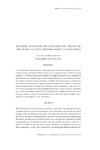Please use this identifier to cite or link to this item:
https://accedacris.ulpgc.es/jspui/handle/10553/6424
| Title: | La novela polifónica en Los perros del paraíso de Abel Posse: la nueva historiografía y sus recursos | Authors: | Torres Agüero, Antonia | UNESCO Clasification: | 550510 Filología 570107 Lengua y literatura |
Issue Date: | 2006 | Journal: | Philologica canariensia | Abstract: | La vieja polémica entre literatura e historia ha sido solventada parcialmente por los escritos teóricos de Hayden White, emtre otros. La aproximación a la Nueva novela histórica y su relación con la historiografía no puedden separarse de la comprensión de la historia y sus variantes, que son un costructo discursivo y, por tanto, no es posible obtener una única versión verdadera y científica. En consecuencia, es posible leer esta “nueva versión histórica” siguiendo parámetros literarios y estéticos, y desde una dimensión discursiva e ideológica. En el presente estudio intentamos analizar la novela Los perros del paraíso del escritor argentinoAbel Posse a la luz de uno de los tropos que se utilizan en ella: la polifonía. La “novela polifónica” (Bajtin) funciona aquí como un modo creativo y eficaz para desarrollar una reconstrucción historiográfica e ideológica de los personajes y de las situaciones. The old polemics between literature and history –and their “overlappings” as historiographic practices with serious intentions– has been partly solved by the theoretical writings of Hayden White, among others. The approach to the New Historical Novel theme and its relation to historiography, cannot be separated from the understanding that history and the various versions we have of it, are discursive construct, and that, consequently, it is not possible to obtain only one scientific and “true” version of it. Thus, it is feasible to read this “new version of history” according to literary or aesthetic parameters or, also, from its discursive and ideological dimension. In the present paper we intend to analyze the novel Los perros del paraíso of the Argentinian writer Abel Posse (1939), in the light of one tropes used in it, i.e., “polyphony”. The “polyphonic novel” (Bajtin) functions here, from our point of view, in an enriching and creative manner owing to the historiographic and ideological reconstruction of the characters and events |
URI: | https://accedacris.ulpgc.es/handle/10553/6424 | ISSN: | 1136-3169 | Source: | Philologica Canariensia. Las Palmas de Gran Canaria: Facultad de Filología de la Universidad de Las Palmas de Gran Canaria, 1994-.-- ISSN 1136-3169.-- n. 12-13 (2006-2007), p. 89 |
| Appears in Collections: | Philologica Canariensia. n.012-13, 2006-2007 Artículos |
Page view(s) 5
146
checked on Jan 11, 2026
Download(s)
128
checked on Jan 11, 2026
Google ScholarTM
Check
Share
Export metadata
Items in accedaCRIS are protected by copyright, with all rights reserved, unless otherwise indicated.
